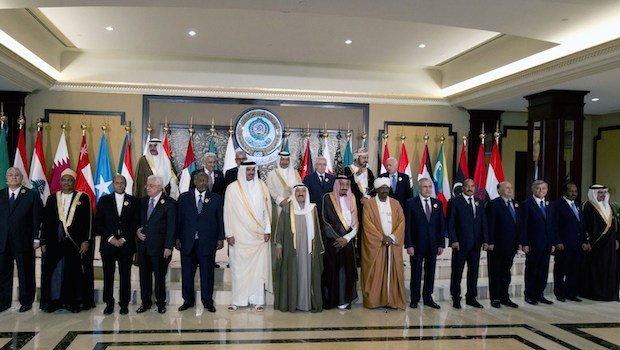
Arab leaders stand for a group photo before the 25th Arab League summit at Bayan palace in Kuwait City on March 25, 2014. (AFP PHOTO/YASSER AL-ZAYYAT)
London, Asharq Al-Awsat—The first Arab Summit hosted by Kuwait kicked off in its capital on Tuesday, amid diplomatic tensions between Gulf states, mounting concern over the ongoing Syria conflict, and political strife in Egypt.
In his remarks to open the summit, Kuwaiti Emir Sheikh Sabah Al-Ahmed Al-Jaber Al Sabah expressed regret for the widening dispute among the Arab states, and said that the Syrian crisis represents a grave threat to regional and international security.
“We should address these differences and united and work together to overcome the disputes,” he said, adding, “We cannot go ahead with our common Arab action with these differences looming on the horizon.”
The Emir of Kuwait did not explicitly refer to any specific country or issue, but his calls for overcoming disputes comes as a rift inside the Gulf Cooperation Council (GCC) continues to play out over the role of the Muslim Brotherhood in the region.
In a sign of growing friction among Gulf states over Qatar’s backing of the organization, Saudi Arabia, Bahrain and the UAE recalled their ambassadors from Doha earlier this month in order to “protect their security and stability,” accusing Qatar of failing to commit to the principles of the GCC.
Khaled Al-Jarallah, a senior official at Kuwait’s Ministry of Foreign Affairs, told reporters that the issue would not be addressed at the summit as it was a GCC matter.
“Gulf reconciliation and Gulf issues are something for inside the Gulf house,” he said.
Qatar’s ruler, Sheikh Tamim Bin Hamad Bin Khalifa Al Thani, used the summit to indirectly criticize Egypt’s crackdown on the Muslim Brotherhood, calling for “political dialogue” in the country.
Egypt has designated the Muslim Brotherhood as a terrorist organization, and several of its leaders and senior members are currently on trial.
Saudi Arabia also recently added the Brotherhood to its list of proscribed terrorist groups.
In addition, Sheikh Tamim criticized Iraqi Prime Minister Nuri Al-Maliki, accusing his government of marginalizing Iraq’s Sunni community.
“It’s about time for Iraq to emerge from the vicious circle of violence and differences. That cannot come about through the sidelining of entire segments of society or accusing them of terrorism if they demand equality and inclusion,” he said.
The ongoing conflict in Syria was also a major item on the agenda. In his opening address, Kuwait’s Emir said: “We are facing a painful reality and a humanitarian, moral and legal crisis, and condemnation will not be enough.”
“We reiterate our call on the UN Security Council to live up to its responsibility to restore international peace and security and to end the crisis,” he added.
Saudi Crown Prince Salman Bin Abdulaziz gave his own speech before the Arab League on Tuesday, calling for the Syrian National Coalition, the main opposition group, to be granted a seat at the summit.
Syria’s membership of the Arab League was suspended in 2011, and there have been recurring calls for the country’s seat to be given to representatives of the Syrian opposition. However, the Syrian seat remained vacant at the summit.
Addressing the Syrian crisis, Crown Prince Salman said: “This summit convenes after the failure of the Geneva II conference in finding a political solution to the Syrian crisis, which has been going on for more than three years and whose price was paid by the Syrian people with their blood and lives . . . All these challenges are resisted by a legitimate Syrian resistance, which has been failed by the international community and left as prey to brutal forces which have prevented the realization of the aspirations of the noble people of Syria to live in freedom and dignity.”
The head of the Coalition, Ahmed Jarba, echoed the Crown Prince’s call, saying: “What we wanted and still want from you is a decisive position of support.”
